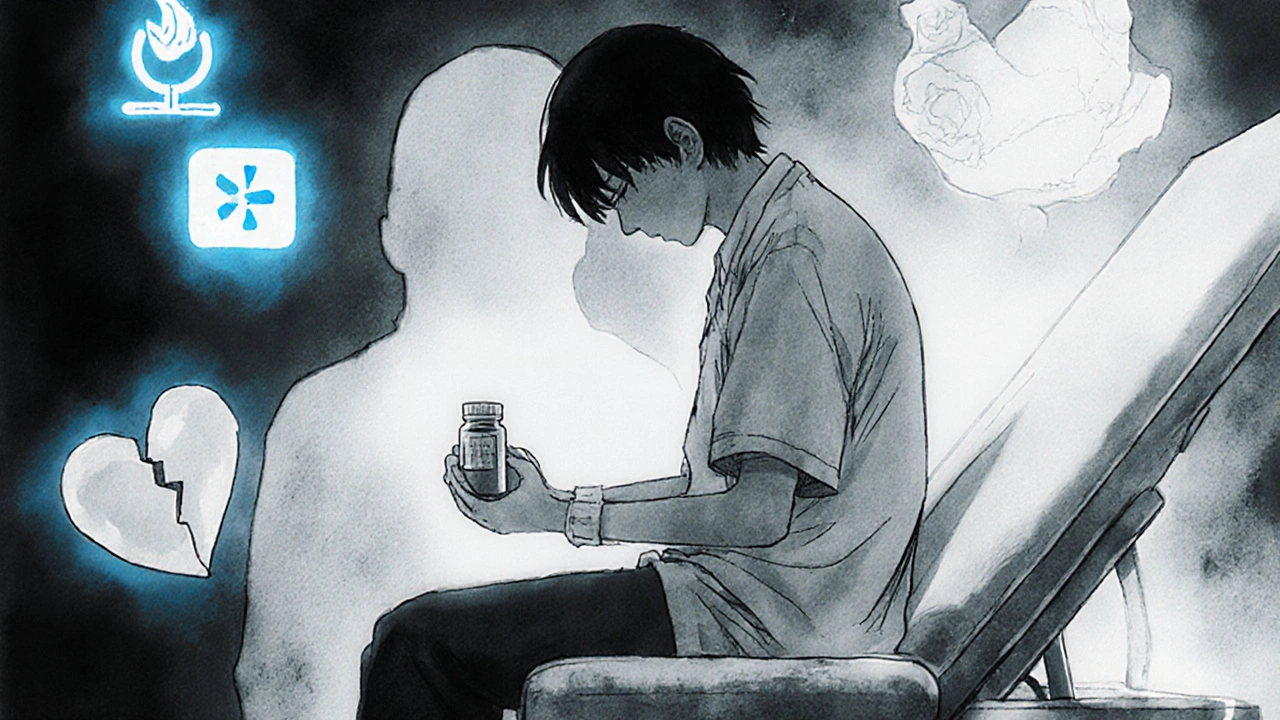Medication Side Effect Checker
Select medications you're taking to see the estimated risk of sexual side effects. This tool is based on clinical research data from the article and shows both the likelihood of side effects and lower-risk alternatives.
Antidepressants
Blood Pressure Medications
Other Common Medications
This tool is for informational purposes only. Always consult with your healthcare provider before making any changes to your medication regimen. Sexual side effects are common and often reversible with proper management.
Sexual side effects from common medications are more widespread than most people realize
If you’ve noticed a drop in libido, trouble getting or keeping an erection, delayed orgasm, or even numbness during sex - and you’re on a regular medication - you’re not alone. These aren’t rare or embarrassing quirks. They’re well-documented, clinically significant side effects tied to some of the most commonly prescribed drugs. In fact, up to 73% of people taking certain antidepressants report sexual problems, and many never tell their doctor because they assume it’s just part of life.
The truth? You don’t have to live with it. These effects aren’t inevitable. They’re often reversible, manageable, or preventable with the right information and a conversation with your provider. This guide breaks down exactly which medications cause sexual side effects, how often they happen, and what you can actually do about them - without stopping your treatment or feeling ashamed.
Antidepressants are the biggest culprit - but not all are the same
When it comes to sexual side effects, antidepressants top the list. About 40% of people taking any antidepressant will experience some form of sexual dysfunction, according to decades of research. But here’s the key detail: not all antidepressants are created equal.
SSRIs - like fluoxetine (Prozac), sertraline (Zoloft), paroxetine (Paxil), and fluvoxamine (Luvox) - are the most likely to cause trouble. Paroxetine carries the highest risk: studies show 65% of users report sexual side effects, including reduced desire, difficulty reaching orgasm, or erectile problems. Fluvoxamine isn’t far behind at 59%. Sertraline and fluoxetine hover around 54-56%.
Why does this happen? SSRIs increase serotonin, which helps with mood - but too much serotonin can shut down sexual response pathways in the brain and nerves. Orgasm becomes harder to trigger, arousal slows, and desire fades.
But there are better options. Bupropion (Wellbutrin) and mirtazapine (Remeron) are antidepressants with much lower rates of sexual side effects. In fact, bupropion is often chosen specifically for patients who’ve had problems with SSRIs. One study found fewer than 10% of bupropion users reported sexual dysfunction - a dramatic difference.
Tricyclics like imipramine cause issues in about 30% of users. But clomipramine? Nearly 93% of patients in one study reported complete or partial inability to orgasm. That’s not a side effect - it’s a dealbreaker for many.
High blood pressure meds can wreck your sex life - and you might not know it
Heart medications are another major source of sexual side effects. Up to 10% of heart failure patients say their sexual problems are directly linked to their meds. The worst offenders? Diuretics and beta blockers.
Thiazide diuretics - especially hydrochlorothiazide (Microzide) - are the #1 cause of erectile dysfunction among blood pressure drugs. They reduce blood volume and can lower blood flow to the penis. Beta blockers like atenolol and metoprolol do something similar by slowing heart rate and reducing circulation.
Women aren’t spared either. About 41% of women on antihypertensives report lower sexual desire. Thirty-four percent say sex just doesn’t feel as pleasurable. Alpha-blockers like clonidine and prazosin are especially linked to low libido in women.
But here’s a surprise: not all blood pressure meds hurt your sex life. Angiotensin II receptor blockers - like valsartan - have actually been shown to improve sexual desire and fantasies in women compared to beta blockers. If you’re on a blood pressure med and noticing problems, ask your doctor if switching to an ARB might help.

Prostate meds and cancer treatments: expected, but not unavoidable
Men taking 5-alpha reductase inhibitors - like finasteride (Propecia) or dutasteride (Avodart) - for enlarged prostate or hair loss often report sexual side effects. About 6-16% lose libido. 5-9% develop erectile dysfunction. And up to 21% have trouble with ejaculation.
Why? These drugs block the conversion of testosterone to DHT, a hormone critical for sexual function. The effect is usually mild, but for some, it’s persistent - even after stopping the drug.
For men with prostate cancer, antiandrogens like bicalutamide are used to starve cancer cells of testosterone. The result? Nearly all patients experience loss of libido, erectile dysfunction, and sometimes breast growth (gynecomastia). These aren’t side effects you can avoid - they’re part of the treatment. But knowing what to expect beforehand makes a huge difference in coping. Counseling and open communication with partners can ease the emotional burden.
Other common drugs that quietly hurt your sex life
It’s not just antidepressants and blood pressure pills. Many everyday meds have hidden sexual side effects:
- Gabapentin and pregabalin (for nerve pain or seizures): These can lower free testosterone and raise sex hormone-binding globulin, leading to erectile problems and low desire.
- Opioids (like oxycodone, hydrocodone): They suppress the hypothalamic-pituitary-gonadal axis, causing low testosterone, erectile dysfunction, and reduced libido - even in short-term users.
- Proton pump inhibitors (PPIs like omeprazole): Some patients report decreased libido and erectile issues, though the mechanism isn’t fully understood. It might involve hormonal shifts or nutrient absorption changes.
- Digoxin and spironolactone: Used for heart failure, these can cause hormonal imbalances that affect sexual function.
Even some antihistamines and antipsychotics - like risperidone - can lower libido or delay orgasm. The list is longer than most people think.

What you can actually do about it
Stopping your medication isn’t the answer - unless your doctor says so. But you have real options.
- Talk to your doctor. Don’t wait until you’re ready to quit your meds. Bring it up early. Say: “I’ve noticed my sex life has changed since starting this drug. Are there alternatives?”
- Switch meds. If you’re on paroxetine, ask about switching to bupropion or mirtazapine. If you’re on hydrochlorothiazide, ask about valsartan. Many switches are simple and effective.
- Try a drug holiday. For some SSRIs, taking a short break (like over a weekend) under medical supervision can restore function without losing mood control.
- Add a helper drug. Sildenafil (Viagra) or tadalafil (Cialis) can reverse SSRI-induced erectile dysfunction in 74-95% of cases. It’s not a band-aid - it’s a proven solution.
- Time your dose. Some people find taking their SSRI after sex reduces interference with arousal and orgasm.
- Move your body. Exercise improves blood flow, boosts testosterone, and reduces stress - all of which help sexual function. Even 30 minutes of walking daily can make a difference.
For men on antiandrogens or women on high-risk antidepressants, counseling and sex therapy can be just as important as medication changes. You’re not broken. You’re responding to a drug - and that response can be managed.
Why this isn’t talked about enough
Doctors don’t always ask about sexual side effects because they assume patients won’t bring it up. Patients don’t mention it because they feel embarrassed, or they think it’s normal - especially if they’re dealing with depression or chronic illness.
But here’s the reality: up to 70% of people with depression already have sexual problems before taking any meds. So when a new symptom shows up, it’s easy to blame the illness - not the pill. That’s why screening is critical. The American Urological Association now recommends routine sexual function checks for anyone on long-term antidepressants, blood pressure meds, or prostate drugs.
Pharmaceutical companies are starting to pay attention too. The FDA now requires sexual side effect data in clinical trials for CNS drugs. New antidepressants are being designed specifically to avoid serotonin-related sexual suppression. The science is catching up.
What to do next
If you’re on any of these medications and noticing changes in your sex life:
- Write down exactly what’s changed - desire, arousal, orgasm, pain, numbness.
- Note when it started - right after starting the med? After a dose change?
- Don’t assume it’s permanent. Most side effects are reversible.
- Bring this list to your next appointment. Ask: “Could this be the medication? What are my options?”
You deserve to feel good - in your mind, your body, and your relationships. Medications should help you live better, not take away the things that make life meaningful. With the right approach, you can keep your treatment and reclaim your sex life.
Can antidepressants cause permanent sexual dysfunction?
In most cases, sexual side effects from antidepressants go away after stopping the drug. But a small number of people report persistent symptoms - sometimes called Post-SSRI Sexual Dysfunction (PSSD). This is rare, and research is ongoing. If you notice symptoms lasting months after stopping an SSRI, see a specialist. Don’t assume it’s normal. There are treatment options, including hormone testing and therapy.
Do all SSRIs cause the same sexual side effects?
No. While all SSRIs carry some risk, they vary significantly. Paroxetine has the highest rate (65%), followed by fluvoxamine (59%) and sertraline (56%). Fluoxetine tends to be slightly less likely to cause orgasm problems. Bupropion and mirtazapine are not SSRIs and have far lower rates - often under 10%. Your doctor can choose based on your risk profile.
Can I take Viagra with my antidepressant?
Yes - and it’s often recommended. Studies show sildenafil (Viagra) and tadalafil (Cialis) are effective in 74-95% of cases for SSRI-induced erectile dysfunction. There’s no dangerous interaction with SSRIs. But always tell your doctor you’re using both. They may adjust the dose or monitor for side effects like low blood pressure or headaches.
Why do blood pressure meds affect women differently?
Women often report lower sexual desire and reduced pleasure, while men more commonly report erectile issues. This is partly because women’s sexual response is more tied to emotional and hormonal factors. Beta blockers and diuretics can lower blood flow and affect hormone levels, which impacts arousal and sensation more broadly in women. ARBs like valsartan, however, have been shown to improve desire in women - making them a better choice when sexual health is a concern.
Is it safe to stop my medication if I’m having sexual side effects?
No. Stopping antidepressants, blood pressure meds, or other chronic medications suddenly can be dangerous. It can cause withdrawal, rebound high blood pressure, or worsening depression. Always talk to your doctor first. They can help you taper safely or switch to a better option without risking your health.
Can exercise help reverse medication-related sexual problems?
Yes. Regular physical activity improves blood flow, increases testosterone, reduces stress, and boosts mood - all of which support sexual function. Even moderate exercise like brisk walking 3-4 times a week has been shown to improve libido and erectile quality in people on antidepressants or blood pressure meds. It’s not a cure, but it’s a powerful tool that works alongside medication changes.

dan koz
November 18, 2025 AT 20:50Josh Bilskemper
November 19, 2025 AT 23:26Katey Korzenietz
November 21, 2025 AT 20:54Michael Bene
November 23, 2025 AT 13:27Ethan McIvor
November 24, 2025 AT 04:01Mindy Bilotta
November 25, 2025 AT 15:39Kevin Estrada
November 26, 2025 AT 09:08Paul Corcoran
November 27, 2025 AT 11:27Storz Vonderheide
November 28, 2025 AT 01:18Brian Perry
November 29, 2025 AT 03:15Chris Jahmil Ignacio
November 29, 2025 AT 16:46Colin Mitchell
November 30, 2025 AT 16:28Stacy Natanielle
November 30, 2025 AT 22:25